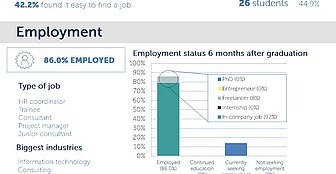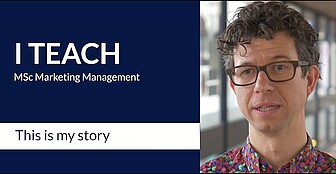
This website uses functional cookies, including analytical cookies. The obtained statistical data cannot be traced back to individual users. Additionally, you can choose to accept or refuse consent to use marketing cookies. If you decline these additional cookies or refrain from making a choice, only functional cookies will be set. See our cookie policy for more information.
Blog: Tuesday, 25 November 2014
“Should I eat this chocolate bar or go for an apple instead?”
We all struggle with questions like this one. It’s hard to sacrifice short-term rewards for long-term benefits. Marketers, and companies more generally, face equally difficult trade-offs on a daily basis.
In my experience with talking to companies from many industries, one of the biggest challenges that managers face is how to balance short- and long-term interests. Ideally, the pressures that we face in our daily job make us take decisions that are perfectly aligned with our long-term goals. Unfortunately, that’s often not the case.
Sacrificing present-day gains for more important, but also more distant, long-term outcomes takes a lot of self-control and discipline. For example, some consumer good companies seem addicted to sales promotions. But are all these discounts in the best long-term interest of the company?
Resisting short-term pressures often also requires a strong moral compass. Milking a customer might seem attractive today when margins are under pressure but there is a price to be paid in the future for any dissatisfied customer that we create.
Imagine walking on a difficult terrain. To make sure that you don’t fall, you need to look carefully where you put your feet. That solves the immediate problem of trying not to fall but it creates another one. If you are only looking down at your feet you can’t look ahead and see if you are going in the right direction. We are pressurised into focusing on our immediate situation and companies need some mechanism that pulls their chin up, so to speak, so that they can look ahead in the distance.
That mechanism is market-orientation. Marketing is the best tool that companies have to break free from the chains that make it difficult for so many organisations to create a long-term orientation.

If you are truly market-oriented, you care about nurturing strong and lasting relationships with your customers and business partners. In other words, if you are market-oriented, you care about your reputation, you care about the goodwill that you are building in the market, and you will be generally much readier to forego opportunities that seem attractive in the short term but that may be deleterious in the long term.
To make a concrete example, if you care about the customer, your dashboard metrics are naturally going to include things such as customer satisfaction, customer equity, brand affinity, net promoter score, or other measures of customer intermediates. These metrics are by nature sticky and reflect the fundamental drivers of demand better than short-term-oriented metrics such as share price, profits or even sales.
Sacrificing present-day gains for more important, but also more distant, long-term outcomes takes a lot of self-control and discipline.
The events of recent years have laid bare the drawbacks and short termism of aligning performance indicators and managerial incentives along purely financial lines. Prominent marketing scholars such as Nirmalya Kumar and Roger Martin have recently emphasised the flaws of ‘shareholder-driven capitalism’, calling for a new ’customer capitalism’ to replace it. If companies are bundles of processes designed to deliver value to customers then, as argued by Ted Levitt, “profit is a meaningless statement of corporate purpose” and what companies should attempt to maximise, to the benefit of both shareholders and society at large, is customer equity and satisfaction. Marketing thus should champion a renewed focus within companies on creating satisfied customers.
Anyone who knows me knows that I enjoy engaging in finance bashing as much as the next person. But let me add that I certainly do not wish to claim that financial metrics should be ignored. Market-oriented companies owe it to their customers – and of course their shareholders – to be financially healthy. For example, companies cannot run out of cash, and should ensure efficient asset utilisation.
What I do wish to claim, however, is a simple truth: if all you care about are profits and sales today, you are going to be less likely to make profits and sales tomorrow.
In today’s uncertain and shifting environment, it is harder than ever for marketers to help steer the entire organisation towards long-term health. Are you going to step up to the challenge?
Wharton School, University of Pennsylvania

Stefano Puntoni is the Sebastian S. Kresge Professor of Marketing at The Wharton School. Prior to joining Penn, Stefano was a professor of marketing and head of department at the Rotterdam School of Management, Erasmus University, in the Netherlands. He holds a PhD in marketing from London Business School and a degree in Statistics and Economics from the University of Padova, in his native Italy.



















Science Communication and Media Officer
Rotterdam School of Management, Erasmus University (RSM) is one of Europe’s top-ranked business schools. RSM provides ground-breaking research and education furthering excellence in all aspects of management and is based in the international port city of Rotterdam – a vital nexus of business, logistics and trade. RSM’s primary focus is on developing business leaders with international careers who can become a force for positive change by carrying their innovative mindset into a sustainable future. Our first-class range of bachelor, master, MBA, PhD and executive programmes encourage them to become to become critical, creative, caring and collaborative thinkers and doers.
